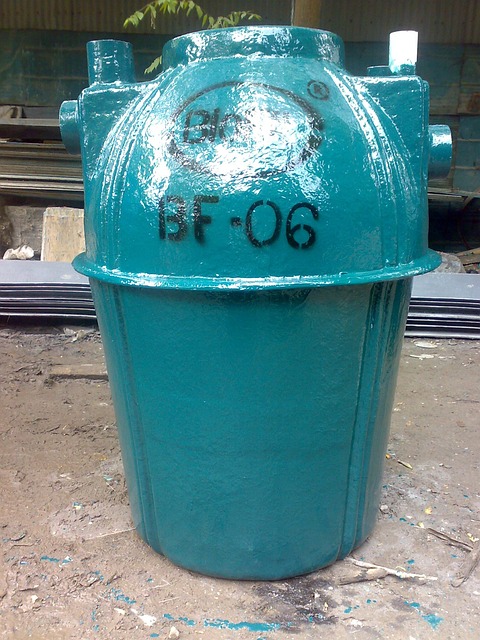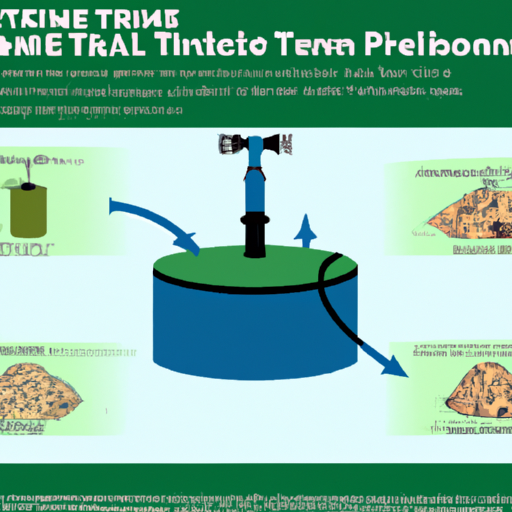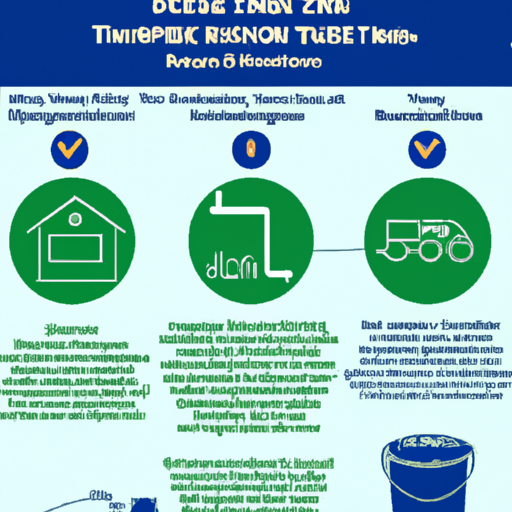Have you ever wondered what the most effective septic tank treatment is? Well, you’re in the right place! In this article, we’ll dive into the world of septic tank treatments and explore the options available to you. Whether you’re dealing with clogged pipes or foul odors, we’ve got you covered.
When it comes to maintaining a healthy septic system, a natural approach might just be the secret. Gone are the days of relying on harsh chemical treatments that can harm your septic tank and the environment. In our first article, “The Secret to a Healthy Septic System: A Natural Approach,” we’ll explore how natural septic tank treatments can help keep your system running smoothly and avoid costly repairs.
But what about those chemical treatments that used to be so popular? In our second article, “Why Chemical Treatments are a Thing of the Past for Septic Tanks,” we’ll discuss why chemical treatments are not only ineffective but also harmful to your septic system. We’ll also introduce you to alternative treatments that are safer and gentler on your septic tank.
So, join us on this journey to discover the most effective septic tank treatment. With our articles, you’ll gain the knowledge and insights needed to make informed decisions about your septic system. Stay tuned for more helpful tips and tricks on septic tank maintenance, cost-saving hacks, and surprising benefits that regular pumping can bring.
Most Effective Septic Tank Treatment
When it comes to maintaining a healthy and functional septic system, proper treatment is key. A well-functioning septic tank not only ensures efficient waste management but also protects the environment and promotes overall water quality. In this article, we will explore the importance of septic tank treatment, the drawbacks of traditional chemical treatments, and the benefits of natural and environmentally-friendly alternatives. We will also discuss common mistakes to avoid, effective maintenance techniques, cost-saving tips, and the role of enzymes in septic tank treatment. Additionally, we will delve into innovative technologies and DIY treatment options, as well as choosing the right professional septic tank treatment services. Lastly, we will evaluate the long-term effects of septic tank treatment on property value, sustainability, and the environment.
The Role of Septic Tanks in Waste Management
Before delving into the importance of septic tank treatment, it is essential to understand the role these tanks play in waste management. Septic tanks are underground tanks that collect and treat wastewater from households that are not connected to a municipal sewage system. They are designed to separate solids from the liquids before the effluent is released into the soil through a drainfield or leach field.
Common Problems with Septic Tanks
Septic tanks can encounter several problems that can disrupt their functionality. Some common issues include clogs, backups, leaks, and odor problems. These problems can arise due to improper maintenance, excessive water usage, or the introduction of non-biodegradable materials into the septic system. Regular treatment and maintenance can help prevent these problems and ensure the longevity of your septic tank.
The Impact of Untreated Septic Tanks on the Environment
Untreated septic tanks can have a detrimental impact on the environment. When septic systems are not properly maintained or treated, contaminants from the wastewater can seep into the soil and groundwater, polluting nearby water sources. This can lead to the contamination of drinking water supplies and harm aquatic life. Additionally, untreated septic tanks can contribute to the spread of diseases and pose health risks to humans and animals.
Why Traditional Chemical Treatments are Ineffective
Chemical treatments have long been used as a solution for septic tank maintenance. However, these treatments come with several drawbacks and can have harmful effects on septic systems.
The Drawbacks of Using Chemical Treatments
Chemical treatments for septic tanks often contain harsh and corrosive substances that can damage the natural balance of bacteria in the tank. These treatments are designed to kill off bacteria and break down solids, but they can also harm the beneficial bacteria needed for proper waste digestion. Furthermore, chemical treatments do not address the root causes of septic tank problems and only provide a temporary solution.
Chemical Treatments vs Natural Treatments
Natural septic tank treatments offer a more sustainable and effective alternative to chemical treatments. Unlike chemical treatments, natural treatments focus on restoring and maintaining the natural balance of bacteria in the septic tank. By introducing beneficial bacteria and enzymes into the tank, natural treatments promote the breakdown of solids and prevent odor and clogging issues. Natural treatments also help in eliminating harmful pathogens and are safe for the environment.
The Harmful Effects of Chemicals on Septic Systems
Chemical treatments can have negative effects on septic systems. The use of harsh chemicals can kill off the beneficial bacteria responsible for breaking down waste, leading to an accumulation of solids and potential clogs in the tank and drainfield. These chemicals can also disrupt the natural balance of the soil and groundwater, causing pollution and contamination. Moreover, the excessive use of chemicals can result in the need for costly repairs and replacements down the line.

Exploring Natural and Environmentally-Friendly Septic Tank Treatments
Natural septic tank treatments offer a safer and more sustainable approach to maintaining a healthy septic system. These treatments focus on enhancing the natural processes within the tank and promoting the growth of beneficial bacteria.
Benefits of Natural Septic Tank Treatments
Natural septic tank treatments offer several benefits over traditional chemical treatments. Firstly, these treatments are safe for the environment and do not contribute to pollution or groundwater contamination. Secondly, natural treatments promote the breakdown of solids and prevent the build-up of sludge, reducing the need for frequent pumping. Additionally, natural treatments help control odors and prevent clogging issues, ensuring the smooth operation of the septic system.
Types of Natural Treatments Available
There are various types of natural treatments available for septic tanks. One popular option is using septic tank additives that contain beneficial bacteria and enzymes. These additives can be introduced directly into the septic tank to aid in waste breakdown and prevent odor problems. Another natural treatment option is the use of natural household products such as vinegar and baking soda. These products can be used for regular cleaning to maintain a healthy septic system.
Installation and Maintenance of Natural Treatment Systems
Installing a natural treatment system for your septic tank may involve the addition of specific treatment units or modifications to the existing tank. Consulting with a professional septic system installer is recommended to ensure proper installation and maintenance. Regular maintenance of the natural treatment system is essential to maintain its effectiveness. This includes regular monitoring of the system, periodic addition of treatment additives, and proper waste management practices.
The Top Septic Tank Treatment Mistakes to Avoid
Avoiding common mistakes in septic tank treatment can help prevent future issues and maintain the health of your septic system.
Ignoring Regular Maintenance
One of the biggest mistakes homeowners make is neglecting regular maintenance of their septic tank. Regular pumping and inspection schedules are essential to prevent the build-up of solids and detect potential issues early on. Ignoring these maintenance tasks can lead to costly repairs and shorten the lifespan of your septic system.
Using Excessive Amounts of Chemicals
Overusing chemical treatments can harm the beneficial bacteria in the septic tank and disrupt the natural waste breakdown process. It is important to use chemicals sparingly and opt for natural treatments whenever possible. Using excessive amounts of chemicals can also lead to groundwater contamination and environmental pollution.
Improper Disposal of Household Waste
Improper disposal of household waste can cause clogs and backups in the septic system. Items such as cooking oil, coffee grounds, wet wipes, and feminine hygiene products should never be flushed down the toilet or poured down the drain. Proper waste management practices, such as recycling and composting, can help prevent septic tank problems.

Effective Techniques for Septic Tank Maintenance
Adopting effective maintenance techniques is crucial for the long-term health and functionality of your septic system.
Regular Pumping and Inspection Schedules
Regular pumping and inspection of your septic tank are essential maintenance tasks. The frequency of pumping depends on the size of your tank, the number of household occupants, and the amount of water usage. Consulting with a professional septic service provider can help determine the optimal pumping schedule for your system. Regular inspections can help detect potential issues and address them before they escalate.
Proper Waste Management Practices
Proper waste management practices play a significant role in maintaining a healthy septic system. Avoid flushing non-biodegradable items or using excessive amounts of water. It is also important to avoid pouring harmful chemicals or grease down the drain. Implementing these practices can prevent clogs and backups in the septic system.
Preventing Clogs and Backups
Taking preventive measures to avoid clogs and backups can save you from costly repairs. Ensure the proper function of your drainfield by diverting excessive water away from it. Install risers and septic tank filters to prevent solids from entering the drainfield. It is also important to address any plumbing leaks promptly, as these can overload the septic system and cause backups.
Cost-Saving Tips for Septic Tank Maintenance
Maintaining your septic tank need not be an expensive endeavor. Here are some cost-saving tips to help you keep your septic system in optimal condition without breaking the bank.
Maximizing Water Efficiency
Conserving water can significantly reduce the strain on your septic system and save you money in the long run. Simple steps such as fixing leaky faucets, using water-efficient appliances, and practicing water-saving habits can make a significant difference. Using a low-flow toilet and installing aerators on faucets can also help reduce water usage.
Choosing the Right Cleaning Products
When it comes to cleaning products, opt for environmentally-friendly and septic-safe options. Harsh chemicals found in many conventional cleaning products can harm the beneficial bacteria in your septic system. Look for products that are labeled as “septic-safe” or “biodegradable.” Natural alternatives such as vinegar, baking soda, and lemon can also be used for cleaning.
DIY Maintenance Techniques
There are several DIY maintenance techniques that can help you save on septic tank maintenance costs. Regularly inspecting your septic system for leaks or clogs, monitoring the water usage in your household, and practicing proper waste disposal can all be done without professional assistance. Educate yourself on the dos and don’ts of septic tank maintenance to avoid unnecessary expenses.

The Benefits of Regular Septic Tank Pumping
Regular septic tank pumping is an essential part of maintenance and offers several benefits for the overall health and functionality of your septic system.
Preventing Costly Repairs and Replacements
Regular pumping helps prevent costly repairs and replacements down the line. When a septic tank is not pumped regularly, solids can build up and cause clogs in the tank and drainfield. This can lead to backups, leaks, and damages that require expensive repairs. Regular pumping ensures the proper functioning of the system and prevents such issues.
Maintaining a Healthy and Functional Septic System
Pumping removes accumulated solids from the septic tank, preventing them from entering the drainfield and clogging the system. This allows the septic system to operate at its optimal capacity and prevents backups and odor problems. Regular pumping is essential for the longevity of your septic system and ensures its continued functionality.
Improving Overall Water Quality
Untreated septic systems can contaminate groundwater and nearby water sources. Regular pumping helps prevent this pollution and contributes to improved water quality. By removing accumulated solids and preventing septic system failures, regular pumping reduces the risk of water contamination and protects the environment.
Understanding the Role of Enzymes in Septic Tank Treatment
Enzymes play a crucial role in the breakdown of waste in septic tanks and are often used in natural septic tank treatments.
How Enzymes Aid in Breaking Down Waste
Enzymes are biological catalysts that speed up chemical reactions. In the case of septic tanks, enzymes help break down organic matter and solids, converting them into liquid form. This process makes it easier for the bacteria in the septic tank to digest the waste and promote efficient waste breakdown.
Different Types of Enzymes and Their Functions
There are various types of enzymes used in septic tank treatments, each with its specific function. Lipase enzymes break down fats and oils, protease enzymes break down proteins, and amylase enzymes break down starches and carbohydrates. By introducing these enzymes into the septic tank, natural treatments enhance the waste breakdown process and prevent clogging issues.
Benefits of Enzyme-Based Treatments
Enzyme-based treatments offer several benefits for septic tank maintenance. Firstly, they aid in breaking down solids and promoting efficient waste digestion. This helps prevent clogs, backups, and odor problems. Secondly, enzyme-based treatments are environmentally-friendly and safe for the septic system. They do not introduce harmful chemicals into the tank and contribute to the natural balance of bacteria.

Innovative Technologies for Enhanced Septic Tank Treatment
Advancements in technology have led to the development of innovative treatment systems that enhance the functionality of septic tanks.
Aerobic Treatment Systems
Aerobic treatment systems introduce oxygen into the septic tank to enhance the breakdown of waste. These systems use aerobic bacteria, which require oxygen to digest waste efficiently. Aerobic treatment systems are effective in reducing solids, preventing clogs, and eliminating odor problems. However, they require regular maintenance and monitoring to ensure optimal performance.
Biofilter Systems
Biofilter systems utilize a combination of natural filtration and biological processes to treat wastewater. These systems incorporate layers of organic materials and bacteria, which break down contaminants in the wastewater before it is released into the soil. Biofilter systems are effective in removing pathogens and pollutants and can be used as an alternative or supplement to traditional septic systems.
Ultraviolet Disinfection Systems
Ultraviolet (UV) disinfection systems use UV light to kill harmful bacteria and pathogens in the septic tank effluent before it is discharged. These systems provide an additional layer of disinfection and help protect the environment from potential contamination. UV disinfection systems are often used in conjunction with traditional septic systems to ensure the safe disposal of treated wastewater.
Exploring DIY Septic Tank Treatment Options
For those who prefer a hands-on approach to septic tank maintenance, there are several DIY treatment options available.
Homemade Septic Tank Treatments
Homemade septic tank treatments can be made using simple ingredients found in most households. For example, a mixture of vinegar and baking soda can be used to clean and deodorize the septic system. Other DIY treatments include adding yogurt or spoiled milk to introduce beneficial bacteria into the tank. While these homemade treatments may provide some short-term benefits, they should be used in conjunction with regular professional maintenance.
Proper Use of Household Items for Maintenance
Certain household items can be used to maintain a healthy septic system effectively. For instance, regular use of hot water and mild dish soap can help prevent clogs and remove built-up grease. Additionally, diverting excess water from your septic system by using a rain barrel can reduce the strain on the tank and drainfield. Using these items properly can contribute to the overall health and functionality of your septic system.
Effectiveness and Limitations of DIY Treatments
DIY septic tank treatments can offer some benefits but should not replace professional maintenance. While homemade treatments may temporarily improve odor issues or reduce minor clogs, they do not address underlying problems or replace the need for regular pumping and inspection. It is important to understand the limitations of DIY treatments and supplement them with professional assistance when necessary.
Choosing the Right Professional Septic Tank Treatment Services
When seeking professional septic tank treatment services, it is crucial to choose a reliable and qualified provider. Factors such as experience, reputation, and certifications should be taken into consideration.
Factors to Consider When Selecting a Service Provider
When selecting a septic tank treatment service provider, consider their experience in the industry. Look for companies with a proven track record and positive reviews from previous clients. It is also important to choose a provider that offers a range of services, including regular maintenance, pumping, inspections, and emergency repairs.
Qualifications and Certifications to Look For
Professional septic tank treatment service providers should have the necessary qualifications and certifications to perform their services. Look for providers that are licensed, bonded, and insured. Certification from organizations such as the National Association of Wastewater Technicians (NAWT) or state-specific regulatory bodies can also serve as an indication of a provider’s expertise and professionalism.
Comparing Service Packages and Pricing
When evaluating different septic tank treatment service providers, compare their service packages and pricing. Look for providers that offer comprehensive packages that include regular maintenance, pumping, and inspections. It is important to consider not only the upfront cost but also the long-term benefits and savings. Choose a provider that offers transparent pricing and clearly communicates the scope of their services.
Evaluating the Long-Term Effects of Septic Tank Treatment
Regular septic tank treatment not only ensures the immediate functionality of the system but also has long-term effects on various aspects.
The Lifespan of Septic Systems with Regular Treatment
Regular septic tank treatment significantly extends the lifespan of the septic system. By preventing clogs, backups, and damages, treatment helps keep the system running smoothly and reduces the need for costly repairs or replacements. With proper treatment and maintenance, a well-designed septic system can last for several decades.
Effects on Property Value and Resale Potential
A healthy and functional septic system contributes to a property’s value and resale potential. Potential buyers consider the condition of the septic system when determining the value of a property. Regular treatment and maintenance demonstrate responsible homeownership and can help ensure a higher resale value for your property.
Sustainability and Environmental Impact
Regular septic tank treatment has a positive impact on sustainability and the environment. By preventing groundwater contamination, septic tank treatment helps protect the quality of nearby water sources. Additionally, natural and environmentally-friendly treatments contribute to the preservation of ecosystems and the reduction of pollution. Responsible septic tank treatment practices are an important part of environmental stewardship.
Conclusion
Effective septic tank treatment is crucial for maintaining a healthy and functional septic system. Traditional chemical treatments are being replaced by natural and environmentally-friendly alternatives that offer numerous benefits. By avoiding common mistakes, adopting proper maintenance techniques, and utilizing cost-saving tips, you can ensure the long-term health and sustainability of your septic system. The use of enzymes, innovative technologies, and DIY treatments can further enhance the effectiveness of septic tank treatment. When seeking professional assistance, choosing a reliable and qualified service provider is essential. Evaluating the long-term effects of septic tank treatment demonstrates the importance of responsible maintenance and its impact on property value, sustainability, and the environment. By prioritizing the most effective septic tank treatment methods, you can protect your investment, your property, and the environment for years to come.